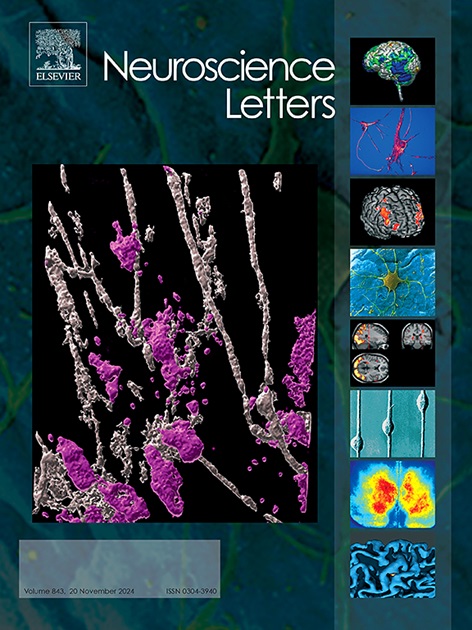Traumatic brain injury, alone or with striatal hemorrhage-like extension, transiently decreases GABA and glutamate levels along motor deficits in the rat striatum: an in vivo study
IF 2.5
4区 医学
Q3 NEUROSCIENCES
引用次数: 0
Abstract
The cerebral cortex is connected to the striatum via the axons of the pyramidal glutamatergic neurons, and this pathway is intimately involved in motor function. In the striatum, glutamatergic afferents initiate the activity of GABAergic medium spiny neurons. This study addressed whether traumatic brain injury (TBI) affects GABA and glutamate extracellular levels in the dorsal striatum as an indicator of effects on the cortico-striatal pathway, in rats with motor deficits and recovered animals. Animals were assigned to a sham group, a TBI-alone group, and a TBI + striatal injury group (local injection of a FeCl2 solution to mimic hemorrhagic lesion). In the TBI-alone and TBI + striatal injury groups, motor deficits were accompanied by decreased extracellular GABA and glutamate levels in the striatum at 3 days post-injury. The TBI + striatal injury group showed higher motor deficits, which lasted 7 days longer, and GABA levels were significantly different compared to the TBI alone group. At 18 days post-injury, in recovered rats from the TBI-alone group GABA and glutamate levels returned to control levels. Alterations in extracellular GABA and glutamate levels indicate damage to the cortico-striatal pathway, underscoring the importance of studying this pathway for treatment and recovery after TBI.
创伤性脑损伤,单独或纹状体出血样延伸,会短暂降低大鼠纹状体运动缺陷中的GABA和谷氨酸水平:一项体内研究。
大脑皮层通过锥体谷氨酸能神经元的轴突与纹状体相连,这条通路与运动功能密切相关。在纹状体中,谷氨酸能事件启动gaba能中棘神经元(MSNs)的活动。本研究探讨了创伤性脑损伤(TBI)是否会影响背纹状体中GABA和谷氨酸的细胞外水平,作为对运动障碍大鼠和康复动物皮质纹状体通路影响的一个指标。动物被分为假手术组、单纯TBI组和TBI + 纹状体损伤组(局部注射FeCl2溶液模拟出血性病变)。在TBI单独组和TBI + 纹状体损伤组中,在损伤后3 天,纹状体的运动缺陷伴随着细胞外GABA和谷氨酸水平的降低。TBI + 纹状体损伤组表现出更高的运动缺陷,持续时间延长7 天,GABA水平与单独TBI组相比有显著差异。损伤后18 天,单纯创伤性脑损伤组恢复的大鼠的GABA和谷氨酸水平恢复到对照水平。细胞外GABA和谷氨酸水平的改变表明皮质纹状体通路受损,强调了研究该通路对创伤性脑损伤后治疗和恢复的重要性。
本文章由计算机程序翻译,如有差异,请以英文原文为准。
求助全文
约1分钟内获得全文
求助全文
来源期刊

Neuroscience Letters
医学-神经科学
CiteScore
5.20
自引率
0.00%
发文量
408
审稿时长
50 days
期刊介绍:
Neuroscience Letters is devoted to the rapid publication of short, high-quality papers of interest to the broad community of neuroscientists. Only papers which will make a significant addition to the literature in the field will be published. Papers in all areas of neuroscience - molecular, cellular, developmental, systems, behavioral and cognitive, as well as computational - will be considered for publication. Submission of laboratory investigations that shed light on disease mechanisms is encouraged. Special Issues, edited by Guest Editors to cover new and rapidly-moving areas, will include invited mini-reviews. Occasional mini-reviews in especially timely areas will be considered for publication, without invitation, outside of Special Issues; these un-solicited mini-reviews can be submitted without invitation but must be of very high quality. Clinical studies will also be published if they provide new information about organization or actions of the nervous system, or provide new insights into the neurobiology of disease. NSL does not publish case reports.
 求助内容:
求助内容: 应助结果提醒方式:
应助结果提醒方式:


